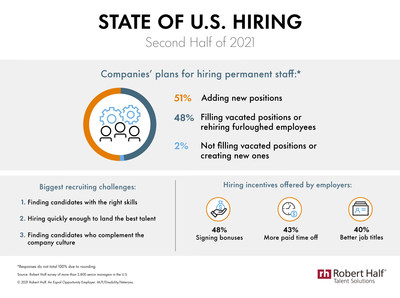Job seekers will have plenty of options in the coming months, research from talent solutions firm Robert Half shows. According to the “State of U.S. Hiring” survey of more than 2,800 senior managers, 51% of respondents anticipate adding new permanent positions in the second half of 2021, and another 48% plan to fill vacated positions or bring back furloughed employees.
Among the 28 U.S. cities in the survey, those with the highest percentages of employers who expect to staff up are San Diego (62%), Dallas (61%), Atlanta and Los Angeles (58% each).
Click for larger infographic or results by practice area, company size and city.
Top Hiring Challenges
While many companies are optimistic about increasing staff levels, there will be hurdles. Senior managers predict the biggest recruiting challenges for the remainder of the year:
- Finding candidates with the right skills
- Hiring quickly enough to land the best talent
- Finding candidates who complement the company culture
“Hiring is happening across the board, and competition for talent is intensifying. Simultaneously, job seekers are becoming more discerning when evaluating opportunities,” said Robert Half senior executive director Paul McDonald. “With these two forces at play, employers need to exceed candidates’ expectations or risk losing them to better offers.”
New Recruiting Strategies
According to the research, some companies are pulling out the stops to entice prospective hires:
- 48% are providing signing bonuses
- 43% are giving more paid time off
- 40% are offering better job titles
But there are some non-negotiables. Only 10% of senior managers are willing to overlook soft skills and certifications when recruiting for hard-to-fill roles. The qualifications they are most willing to bend on include:
- Advanced degree (23%)
- Years of experience (19%)
- Education level (14%)
Pivoting When the Clock is Ticking
Many employers are also flexible when it comes to a candidate’s location. Senior managers said it can take up to 7 weeks, on average, to hire for an open position; for nearly 1 in 4 employers (22%), it can take more than 2 months. When faced with a lengthy hiring process, 60% of companies are broadening their search beyond their geography to find qualified candidates.
McDonald noted, “Professionals with in-demand skills often have their pick of jobs. To stand the best chance of winning over top candidates, employers need to modernize and minimize role requirements, move quickly, and make the most competitive offer possible from the start.”
Thanks for reading CPA Practice Advisor!
Subscribe Already registered? Log In
Need more information? Read the FAQs





